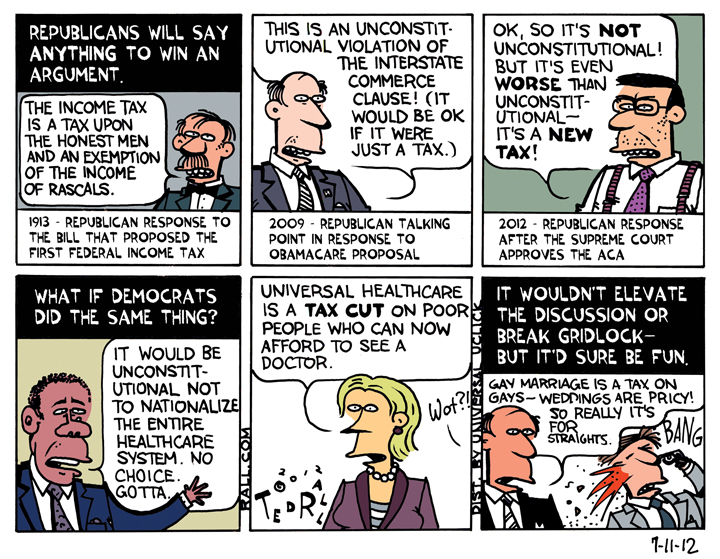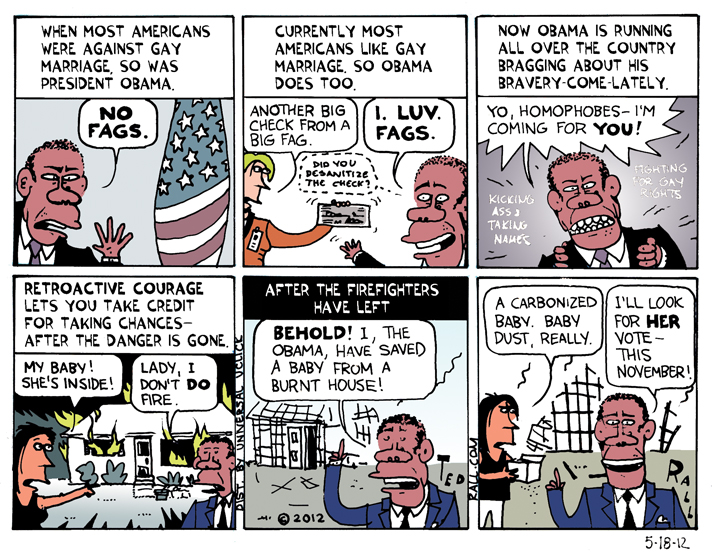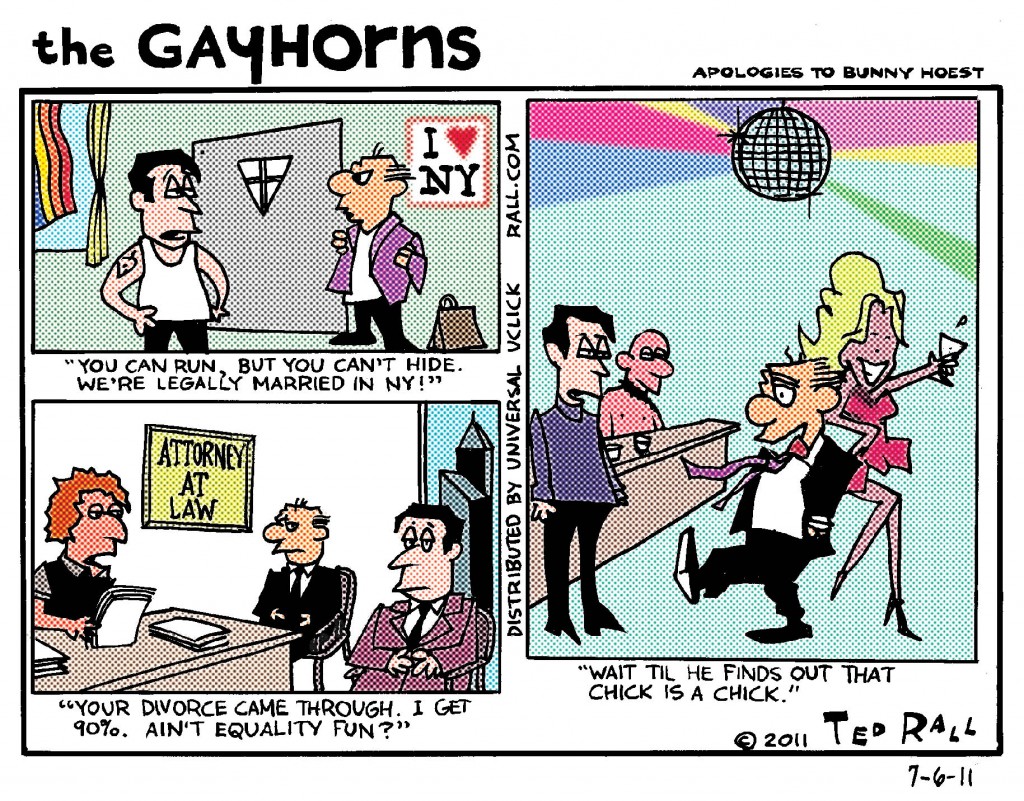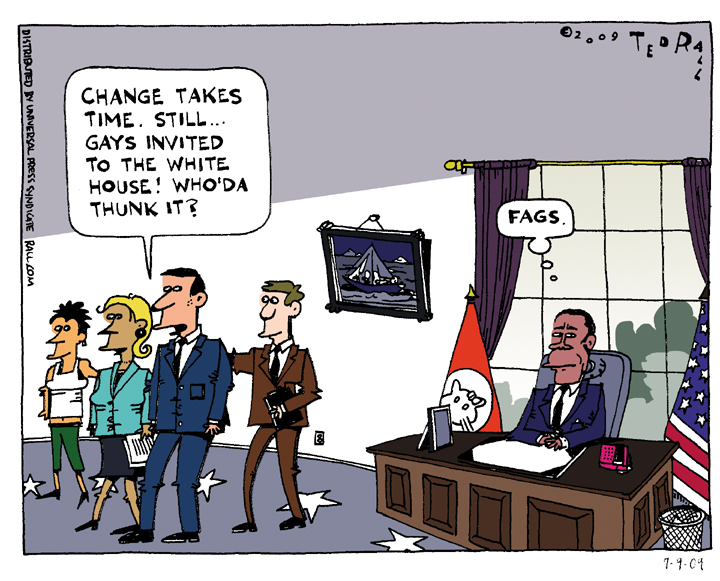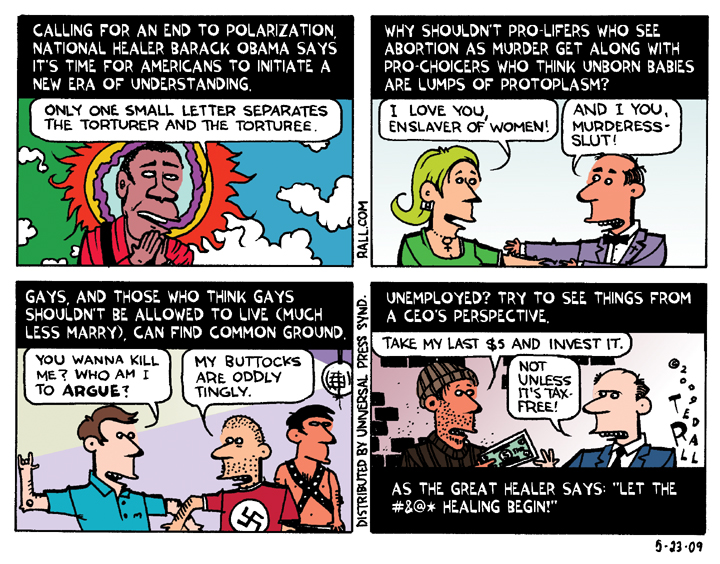As Republicans switch their talking points back and forth over taxes and Obamacare, it’s worth remembering that this is merely the latest example of their willingness to say and do anything to get their way in an argument.
SYNDICATED COLUMN: Where’s the Legacy?
Political Malpractice and Missed Opportunities under Obama
I’m on book tour, promoting “The Book of Obama: How We Went From Hope and Change to the Age of Revolt.”
In “The Book of Obama” I argue that Obama is America’s Mikhael Gorbachev. Like Gorby, The One (Oprah’s phrase) is the most progressive, decent and intelligent leader his system is willing and able to allow to rise to power; like the reformist of perestroika, Obama’s fundamental not-so-badness—coupled with his…ineffectiveness? cluelessness? conservatism? exposes the fact that the system is the problem. That voting for a better/less evil leader can’t bring about the changes we need, because what the 99% view as problems—unemployment, underemployment, the growing gap between rich and poor—are things that the system views as not merely desirable, but necessary. Its raison d’être.
Among progressives it’s a given that Obama has been a disappointment. At my signings people keep asking me: Why? Why hasn’t the president lived up to the hopes and dreams we invested in him? Sure, the Republicans have blocked him at every turn. But he doesn’t seem to try.
Why not? Is he a wimp? Or were liberals wrong about him—was Obama an establishment conservative from the start?
I don’t know what’s in Obama’s heart. Frankly, I don’t care. It’s all about policies: either you’re for good policies, or you’re not. If you are, you fight for them with everything you’ve got. If not…
Like most pundits, I tend to focus on the negative. So this week let’s look at Obama’s signature accomplishments, the things he actually did get done: healthcare reform, his statement support for gay marriage, and last week’s Dream Act Lite, his order that Department of Homeland Security stop pursuing the approximately 800,000 young people who were brought to the U.S. illegally.
It took three years for this President to do something that brought a smile to my face. So I owe him this: Nicely done, Mr. President. (Sure, it’s just a political ploy, a play for the Hispanic vote. But other things Obama should do, but won’t—unlimited unemployment benefits, assistance for foreclosure victims, a new WPA—would be popular too. Pandering to the people is called democracy.)
Millions of people—the lucky 800,000, their families and friends—finally have their foot in the door. Early signals from GOP bosses indicate reluctance, even if they win this fall, to revert to the bad old days of rounding up kids and deporting them to “homes” they don’t know, whose languages they don’t speak.
Yet, like so many of his more positive acts, it came later than it should. And it should have been built to last.
The Dream Act failed in December 2010, just after the Republican sweep in the Congressional midterms. It would have passed if not for the craven, bigoted “nay” votes of five Democratic senators spooked by the election results.
I keep thinking back to 2009. Democrats had both houses of Congress. A filibuster-proof majority in the Senate. Obama enjoyed a worshipful media. Sky-high public opinion polls. Why didn’t the president propose the Dream Act then, when it would probably have passed, sparing 800,000 kids terrible uncertainty—not to mention those who got swept up during the last three years? (While we’re at it: what’s the point of letting kids stay in the U.S. and deporting their parents?
Back in 2009, was Team Obama guilty of political ineptitude? Obsessive focus on healthcare? We don’t know. The result of their neglect of young immigrants amounted to political malpractice at least, bigotry at worst. (There were, after all, more deportations of illegals under Obama than under Bush.)
Worse than too little and/or too late, Obama’s announcement in support of gay marriage came so late that it might as well not have happened at all; by the time he spoke out, gay marriage had become a historical inevitability. Talk about political malpractice! What is more ineffectual than irrelevance? Like the Homeland Security directive on illegals, it came as big, good news to millions of people. But it could have been handled earlier, proactively, and—not incidentally—paying bigger dividends to the president’s reelection effort.
Less clear but with broader implications was healthcare reform. “Have you had enough of Obamacare?” Tim Pawlenty asked a crowd at a pro-Mitt Romney rally. “Yes!” they shouted. But there is no Obamacare. Not yet. Even if the Supreme Court doesn’t overturn the Administration’s biggest achievement, it doesn’t go into effect until 2014. After, perhaps, President Romney takes office. What was Obama thinking? If nothing else, wasn’t he worried about his historical legacy?
My guess is that he cares less about his legacy, or changing things, than the political horse race. He likes winning as an individual more than he cares about changing the world.
Obama has a few chances left to prove me wrong. He could still close Gitmo by executive order. He could also propose a federal law legalizing abortion, forcing the GOP to counter the 77 percent of Americans who told the most recent Gallup poll that they’re pro-choice. It would be a bold move, one that would resolve the decades-long legal limbo that has left abortion rights in the hands of the Supreme Court. Is Obama incapable of bravery? Of vision? Or is he using the threat of a Romney SCOTUS to threaten women into voting for him?
No one knows.
All we can do is consider the president’s actions.
(Ted Rall’s new book is “The Book of Obama: How We Went From Hope and Change to the Age of Revolt.” His website is tedrall.com. This column originally appeared at MSNBC.com)
(C) 2012 TED RALL, ALL RIGHTS RESERVED.
SYNDICATED COLUMN: The Last Civil Rights Struggle
Sluts of America, Arise!
“A sitting United States president took sides in what many people consider the last civil rights movement,” Adam Nagourney of The New York Times wrote in reaction to Barack Obama’s endorsement of gay marriage.
The last civil rights movement?
No.
Sadly, even as he belatedly championed equality for some, the president’s statement expressed a pernicious, widely accepted form of prejudice.
Look for the caveat as you read: “I have to tell you that over the course of several years as I have talked to friends and family and neighbors, when I think about members of my own staff who are in incredibly committed monogamous relationships, same-sex relationships, who are raising kids together…at a certain point I’ve just concluded that for me personally it is important for me to go ahead and affirm that I think same-sex couples should be able to get married.”
In Obama’s worldview, in other words, it’s okay to be gay. But only if you behave like straight people—straight as in hetero, and straight as in conventional.
Obama is exposed as a monogamist: one who discriminates against people who have sex with multiple partners. Monogamism is commonplace. And it is bigotry. Monogamism is no more justifiable than racism or sexism or homophobia and, one day, it will be as reviled.
Mia McKenzie of the blog Black Girl Dangerous responds to Obama: “So, basically, what the President is saying is that same-sex couples who are in relationships that look a certain way (monogamous, for example) should be able to have all the rights of straight people. Hmm. What about those of us, queer and straight, who aren’t into monogamy but are into committed relationships? (And, for the record, you can be poly and be committed to multiple people).”
To which I’ll add: What about people, straight and gay, who sleep with multiple partners? What about those who don’t want committed relationships? Shouldn’t they get tax breaks and insurance benefits too?
And what about the open, tricky, ever-so-dirty secret—that many people in “incredibly committed monogamous relationships” cheat, that they’re de facto polygamists or just garden-variety sluts? (“A full 99 percent of Americans say they expect their spouse to be faithful,” according to U.S. News & World Report in 2008 but, The New York Times reported the same year, “University of Washington researchers have found that the lifetime rate of infidelity for men over 60 increased to 28 percent in 2006.” Hmm. Not to mention, obviously, that not all cheaters confess their sluttery to pollsters.)
Like all oppressed people, sluts have their work cut out for them.
“The Ethical Slut” (1997) by Dossie Easton and Catherine A. Liszt unleashed a landmark broadside against monogamy with a simple argument: anything that two consenting adults do is okay as long as they approach one another, and their other partners, with honesty and openness. Casual hook-ups, open relationships, swinging, group sex, and other alternative forms of sexual expression, wrote Mmes. Easton and Liszt, are not immoral so don’t feel guilty about them. “We believe it’s okay to have sex with anybody you love, and we believe in loving everybody,” they wrote.
Fifteen years later, however, tens of millions of sluts live underground, compelled to sneak around. Unlike straights and Obama-approved monogamous gays, America’s secret sluts have to hide their sex lives from their friends, families and coworkers. (Ethical sluts tell their partners the truth.) “My FWB and I had an awesome foursome with this couple we met online” isn’t the smartest Monday-morning conversation starter for the wannabe upwardly mobile.
Monogamy may be a myth, to paraphrase the title of the 1989 book that found that roughly half of all married Americans cheat, but as Obama’s statement suggests, it’s harder to kill than herpes.
Now here comes “The Monogamy Gap: Men, Love and the Reality of Cheating” by Eric Anderson (Oxford University Press, 256 pages, $49.99), a devastating critique of monogamy that has been ignored by book reviewers and buried by the mainstream media.
“The Ethical Slut” says it’s OKAY to be slutty. “The Monogamy Gap” goes further. It states loudly, brashly—and mostly convincingly—that while monogamy is right for some people, it’s wrong for most. Which makes monogamism a form of bigotry not only based on a lie, but like other forms of discrimination, downright bad for society.
Not so deep down, we know he’s right. When there’s a public sex scandal—John Edwards, Eliot Spitzer, etc.—you don’t hear a lot of expressions of anger or disgust, just harrumphs and how-about-thats from people, most of whom can easily imagine themselves “guilty” of the same “crime”: hard-wired horniness.
“I suggest that we need multiple forms of culturally acceptable sexual relationship types—including sexually open relationships—that exist without hierarchy or hegemony,” Anderson writes.
Men, Anderson asserts, are trapped in a state of “dyadic dissonance” in which they are painfully torn between monogamist social programming and their sexual desires to sleep with multiple partners. “If [men] entertain with their partners the possibility that sex and love are separate and that they could maintain the love with their partner while seeking thrilling sex with outsiders (an open sexual relationship), they risk losing their partners. Even mentioning this is thought to be an affront to love. Love, they falsely believe, is enhanced through sex, and sex with outsiders is falsely believed to detract from the love of a couple. We all too often believe that if our partner ceases to desire us sexually, he or she ceases to love us.”
What is a [stymied] manslut to do?
“In desiring but not wanting to cheat,” Anderson continues, “men set out to rectify their dissonance through pornography, visualizing themselves having sex with someone else while having sex with their partner, and/or flirting with others online. Eventually, however, these imagined/cyber forms of extradyadic sex are not enough. Men strongly desire to have sex with someone else, and they often begin to feel anger or aggression at their partner because (at one level) it is their partner that is preventing them from having the type of sex that every cell in their body demands.”
So they screw around.
But cheaters aren’t bad people. They’re just sluts. They’re wired that way. Many—most of us—are sluts. Don’t be shocked. After all, contemporary marriage—based on love rather than property, monogamous rather than polygamous—is still in its experimental stage, less than a century old. And the rate of divorce suggests that the experiment isn’t going well.
Anderson says monogamism forces us to choose between guilt and frustration: “Although cheating remains almost universally taboo in modern societies, my research suggests that cheating might actually save relationships [because] cheating permits men to have the sex with others they somatically desire…with cheating they do not have to deal with the threat of losing their partners by mentioning their sexual desires for others.”
I have some issues with “The Monogamy Gap.” Anderson concludes that “it is only in open relationships where long-term sexual and romantic satisfaction can be found for people who somatically desire sex with others,” yet he hardly considers the needs and desires of heterosexual women. Do they want open relationships? Maybe. Maybe not. Also, Anderson’s preferred model—one or several core committed, longer-term relationships plus à la carte “hit it and quit it” assignations—leaves out other formats, such as swinging (which is barely discussed).
Overall, however, I strongly recommend “The Monogamy Gap” for anyone who wonders why a society that elevates monogamy can’t seem to follow its rules. America needs to begin this discussion.
(Ted Rall’s next book is “The Book of Obama: How We Went From Hope and Change to the Age of Revolt,” out May 29. His website is tedrall.com.)
SYNDICATED COLUMN: Leading From the Back
Obama Accepts 21st Century View of Gay Marriage
In the BDSM world the phrase “topping from the bottom” means conditional submission: when the sub questions or disobeys the instructions of his or her dom. Subverting the submissive role defeats the whole purpose of a BDSM relationship; it is thus frowned upon.
President Obama frequently engages in the political equivalent: leading from the back.
True leaders lead. They declare what society needs and tells it what it should want. Leaders anticipate what is possible. They open the space where long-held dreams intersect with current reality, allowing progress. “Do not go where the path may lead; go instead where there is no path and leave a trail,” Emerson advised.
The role of a leader has been clearly defined since the first time a member of a clan convinced his tribe they should follow him if they wanted to find more food. So why has it been so long since we Americans had real one?
In recent decades we have had two kinds of political leaders, bullies and followers. Beginning with Nixon but more so with Reagan and George W. Bush, Republican presidents have been bullies. Unwilling or unable to achieve the consensus of the majority for their radical agendas, they got what they wanted by any means necessary—corrupting the electoral process, lying, smearing opponents, and fear-mongering.
The Democrats—Carter, Clinton, and Obama—have been followers, and thus far less effectual. Leaders from the back.
Carter was the proto-triangulator, tacking right as a hawk on the Soviet invasion of Afghanistan and the Iran hostage crisis, while ignoring his liberal supporters. Clinton famously relied on toe-sucking Machiavellian pollster Dick Morris to develop stances and market memes that synced up exactly with public opinion on micro mini wedge issues. Both men left office without any major accomplishments—unless you count their sellouts to the Right (beginning “Reagan”‘s defense build-up, NAFTA, welfare reform).
Obama’s decision to come out in favor of gay marriage is classic Morris-style “leading from the back.”
“Public support for same-sex marriage is growing at a pace that surprises even professional pollsters as older generations of voters who tend to be strongly opposed are supplanted by younger ones who are just as strongly in favor,” notes The New York Times. “Same-sex couples are featured in some of the most popular shows on television, without controversy.”
No wonder: the latest Pew Research poll shows that 47 percent of voters support gay marriage, versus 43 percent against. (Among swing voters—of more interest to the Obama campaign—support is 47-to-39 percent in favor.)
“I believe marriage is between a man and a woman. I am not in favor of gay marriage,” Obama said days before the 2008 election. At that time, Americans were running 40-to-56 percent against allowing same-sex couples to wed.
I can’t read his mind, but I bet Obama was OK with gay marriage in 2008. Like most other educated people. Cynically and wrongly, he sided with anti-gay bigots because he thought it would help him win.
The president’s change of ideological heart was painfully awkward. “I have hesitated on gay marriage in part because I thought that civil unions would be sufficient,” he told ABC. “I was sensitive to the fact that for a lot of people the word ‘marriage’ was something that invokes very powerful traditions, religious beliefs and so forth.”
But now that’s changed, he said. “It is important for me personally to go ahead and affirm that same-sex couples should be able to get married.”
If Obama was a real leader, he wouldn’t care about offending “a lot of people”—i.e., right-wing homophobes. He would have gotten out front of the issue four years ago, when it mattered. The truth is, Vice President Joe Biden’s unscripted remarks a few days ago forced the issue.
Maybe Biden has the makings of a leader.
Six states and the District of Columbia have legalized gay weddings. True, the president’s statement may hasten the demise of the vile Defense of Marriage Act, which blocks federal recognition of gay marriage (and which Obama’s Justice Department defended in June 2009). But it comes too late to be meaningful.
Gay marriage was a historical inevitability before Obama spoke.
That hasn’t changed.
“For thousands of supporters who donated, canvassed and phone-banked to help elect Barack Obama, this is a powerful reminder of why we felt so passionately about this president in the first place,” said Michael Keegan, president of People for the American Way, a pro-Democratic Party interest group.
Maybe so. I don’t see it that way. I see a nation that led itself on this issue. The public debated and thought and finally, at long last, concluded that gays and lesbians deserve equal treatment before the law.
Obama didn’t lead us. We led him.
So tell me—what good is he, exactly?
(Ted Rall’s next book is “The Book of Obama: How We Went From Hope and Change to the Age of Revolt,” out May 22. His website is tedrall.com.)
SYNDICATED COLUMN: The GOP Bets on Bad Judgement
Voters Focus on Spending at Just the Wrong Time
Ross Douthat, the conservative columnist who elevates bland to middle-brow art for The New York Times, thinks Republicans have overreached in their showdown with Obama over the debt ceiling. “[The Republicans’] inability to make even symbolic concessions has turned a winning hand into losing one,” he says.
Advantage, according to Douthat, representing the mainstream media: Obama.
Of course, Obama had already agreed to begin dismantling Social Security and Medicare, surrenders Republicans have craved for decades. If he pulls off this “victory” Obama will have done more damage to the Democratic Party and its core values than any president in our lifetimes. How will he promote what Douthat fears will be a “victory”? I wonder.
Or, to lift a line from “Double Indemnity”: I wonder if I wonder.
Back a few pages, Times reporter Jesse MacKinley finds himself in the curious position of writing that no one really cares about a story that has dominated the headlines for weeks.
“Indeed, the drama of whether the government will raise the debt ceiling (to the chagrin of some conservatives demanding tighter financial belts) or allow it to remain as is (to the horror of the administration and economists who predict financial ruin) seemed largely lost on a populace involved in more pressing—and more pleasant—summer distractions,” asserts MacKinley.
To summarize:
No one cares about the debt ceiling.
And:
Among the few political geeks who understand what’s going on, much less have an opinion, the tide is allegedly turning in favor of Obama because he’s willing to compromise and the Tea Party-led GOP isn’t.
Conventional wisdom floggers like Douthat say that if Congress can’t strike a deal and economic consequences follow—a reduction in the ratings of U.S. government-issued securities and a panic in the securities market—voters will hold Republicans accountable in 2012. Even if things don’t turn that far south, the GOP will pay for their intransigence. Obama wins in a cakewalk.
I’m not so sure.
In the same way that generals usually refight the last war, mainstream political pundits often apply old scenarios to new situations. This is not 1995, when then-House Speaker Newt Gingrich orchestrated a shutdown of the federal government that set the stage for Bill Clinton’s reelection the following year.
Without a doubt, the Republicans’ willingness to imperil the pure platinum credit of Treasury notes and bonds is reckless and irresponsible. There is also no denying their naked hypocrisy and intellectual dishonesty. These so-called “deficit hawks” voted 19 times to raise the debt ceiling by $4 trillion.
If Republicans were serious about balancing the federal budget they’d start by slashing the military, which accounts for 54 percent of discretionary spending—and which hasn’t done anything to defend the U.S. from a real enemy since 1945. The Department of Homeland Security, a vast new bureaucracy created by Bush after 9/11 in order to make us take off our shoes, should be eliminated.
Moreover, the middle of the biggest economic meltdown since the industrial revolution is no time to be cutting debt. Read your Keynes: governments are supposed to spend their way out of downturns, and pay down debt during upswings.
Republicans, it seems, are trying to finish off an economy that is already gravely wounded.
Politically, however, I think they’re onto something. Year after year of warnings about the expanding national debt—remember Ross Perot’s charts?—the American people are finally, genuinely alarmed about the pace and scale of government spending. The current national debt of $14 trillion isn’t the magic number that flips some sort of switch in the public.
It’s simply that, at certain times, public opinion on an issue that has been around for years, divisive and apparently intractable, suddenly coalesces into widespread consensus. Climate change. Gay marriage. The war in Afghanistan, which was so popular in 2008 that Obama won by promising to expand it, but is now seen as stale and unwinnable.
Win or lose on the debt ceiling showdown, GOP strategists are betting than voters will reward them for taking an uncompromising stand on spending against a president who has increased the national debt faster than any of his predecessors. It’s not 100 percent—but I’d say it’s a pretty safe bet.
This is the worst possible time for the American people to start worrying about out-of-control federal spending. But it’s good for the GOP.
(Ted Rall is the author of “The Anti-American Manifesto.” His website is tedrall.com.)
COPYRIGHT 2011 TED RALL

